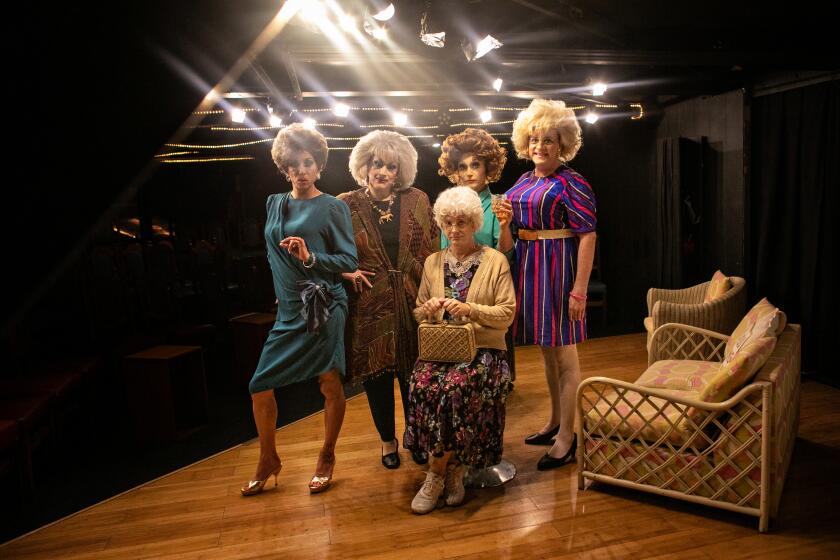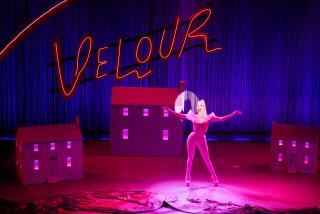For drag queen talk show host Delta Work, the phrase ‘luxury public access’ is more than a manifesto

- Share via
“Nighttalk With Jane Whitney.” Ralph Lauren gift sets with purchase. Women smoking while reading gossip magazines under salon hairdryers. Avon sales ladies. Acrylic nails and day-to-night dangle earrings …
“It all seemed so elegant!” Delta Work recalls of the bygone era of 1980s and ’90s fashion and fantasy in Los Angeles that served as her earliest inspiration. She spent childhood summers sweeping up hair at Total Look, her aunt’s salon, countless hours poring over magazines, watching the golden era of talk TV like “The Marsha Warfield Show” in her Norwalk home. She describes the picturesque salon vividly, from the Jafra products to Patrick Nagel prints on the wall and the armrest ashtrays. It’s no surprise that the drag queen turned Emmy-winning hairstylist and luxury public access podcast host is obsessed with details. This is part of her love language.
“Very Delta” is Delta Work’s weekly YouTube talk show where she “looks gorgeous, speaks extemporaneously, and invites fascinating guests to sit on her couch” and chat about things that are “Very Delta.” This usually includes snack rankings, retail drama and queer histories. On Thursday, Delta is celebrating her birthday and her podcast’s 2025 kickoff with an installment of “Very Delta Live” at Hamburger Mary’s in Long Beach.
“Very Delta” has built a loyal fan base. Last month Artforum named it the best TV show of 2024 — ranking alongside established network shows from HBO and ABC. “We decided that it’s a luxury talk show, because it is if I say it is. Just because it’s on YouTube doesn’t mean it’s not a talk show,” declares Delta.
To bring that luxury to life, Delta transformed the public access-style hodgepodge of set leftovers at Forever Dog’s Moguls of Media studio in North Hollywood into an environment that felt more like a ‘90s talk show desk, combined with the glamorous department store makeup counters she spent so much time working behind, complete with featured items from Delta’s collection and faux flowers. Every fall she decorates her desk like a suburban house awaiting trick-or-treaters, with a rotation of over-the-top, dollar-store seasonal decor.
Before competing on “Drag Race,” doing celebrity hair and landing VMA performances with Miley Cyrus and Taylor Swift, Delta was a performer and producer at Dream Girls Revue and frequented the local contest circuit at clubs like Drag-A-Licious at Ripples in Long Beach and Drag-O-Rama at Ultra Suede in WeHo, with one wig and a lot of spirit.
Nightclub drag shows will always hold a special place in Delta’s heart. While she purchased a “Natalie Merchant”-looking dress at Ross in 1994 to wear to a Halloween rave after encouragement from her Cerritos College cosmetology and journalism schoolmate, her real drag debut was at Buena Park’s legendary gay bar Ozz, when drag, makeup and fashion superstar Raja Gemini offered her a fill-in spot after months of attending Sunday night shows. Delta grabbed a CD from her car, Katalina’s “DJ Girl,” and took the stage in a handmade black tube dress, heels with the back strap cut off, butterfly clips and a pink feather boa from Claire’s.
Performing online felt like a natural progression. “I realized, this is where I can connect with people,” Delta says. “I’m not a dancer, I’m a high-quality romancer. Maybe they don’t need to see 10 tapping toes. I can do something else.”
Delta’s early guests were close friends like Natasha Estrada, a stripper and a mom, and Eddie DeBarr, a Halloween Horror Nights decorator. As she pivoted to include queens, she didn’t want to ask the same questions as other outlets, thinking it would be more fun to bring them into her world. “I realized we were branding the show to be, ‘What’s your favorite chips? Why? If you have to drink diet soda, which one are you going to drink?’ Everybody has their silliness.”
“Frying the small fish” is a term Delta uses to acknowledge the campy frivolity of some of the topics on her show. “I can’t solve the world’s problems. I’m trying! But what do I have control over? The silly things that we do every day.” Serving the community is more than just an adage. She loves making uplifting and personal Cameo videos, not just as a source of income but to engage with fans who can’t access nightclubs. Last week she donated her Cameo revenues to fire relief.
Her “Go Off Delta” rants are relatable monologues that tackle everyday topics like falling out of love with Target for its confusing lack of cilantro in “predominantly Hispanic neighborhoods,” taking down corporate Pride, soup disappearing from L.A. restaurants, Zillow scams and airport drama. Her interviews follow suit. Last season she got Countess Luann de Lesseps of “Real Housewives of New York” fame to make fart noises, learned about TikTok influencers Sugar and Spice’s favorite public bathrooms, and analyzed why black licorice is hard to swallow with drag queen turned Broadway performer Jinkx Monsoon. Delta also gets to the core of who people are and creates an environment where queer histories unfold one broken-down car, backstage dream and rhinestone at a time.

When asked about her passion for including queer history on her podcast, Delta can’t help but share meaningful stories about friends and role models passing through the same places on different timelines. She remembers Madam Pamita playing punk gigs at Peanuts on Santa Monica Blvd on off nights between drag shows. Lesbians like her friend Lori hanging out at Little Frida’s Coffee House in WeHo, supporting people with HIV. She still gets wistful and emotional, remembering an L.A. that lives on in music and the legacies of people she loves. “When you drive and hear a song and you’re in that space, you think to yourself, ‘What if I could go back there one more time?’ Would Lori have been there? Maybe she was at Denny’s when I was there. Would Pam have been there? Maybe she was doing a gig. I think about that when people come on the show.”
“Very Delta” traverses time, bringing memories together, creating overlying queer maps that support one another’s experiences and add new pieces to an endless puzzle of connections. Her podcast feels like being in an old-school gay bar where intergenerational groups learn from one another, sharing outrageous stories, hot gossip and tips for survival, always punctuated by laughter and looking forward to what’s next.
When asked what’s next for herself, Delta has big dreams. “I would love ‘Very Delta’ to continue to travel and to be televised. I could be a QVC salesperson, Let’s sell! Let’s talk about perfume. Maybe ‘Very Delta,’ the movie. What would it be? Who would play me? Probably Rosie O’Donnell!”
Details are not tedious for Delta; they’re a way of acknowledging highly considered elements that many overlook in the hustle of modern life, against the push toward sterile commercial narratives.
“Every single moment, every breath, what she smelled like, what he said, what shoes they wore, what color were the laces?” These questions are protective armor against threats of the erasure of queer life under recent anti-drag pushes and a second Trump presidency. “I don’t want what we wore in 2024 to be not remembered, because nobody wrote it down or no interviewer asked: What did you really think? What happened? Now more than ever, I mean this very moment, we have to document everything.”
More to Read
The biggest entertainment stories
Get our big stories about Hollywood, film, television, music, arts, culture and more right in your inbox as soon as they publish.
You may occasionally receive promotional content from the Los Angeles Times.












